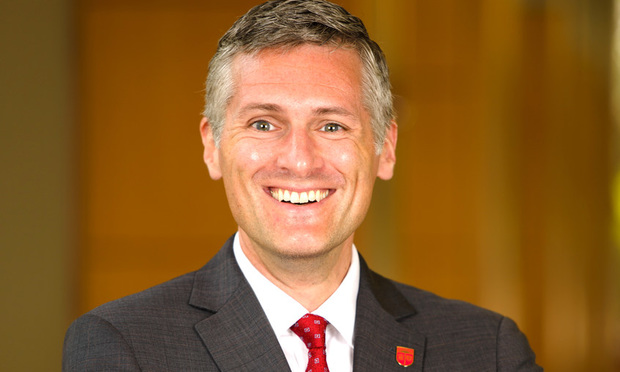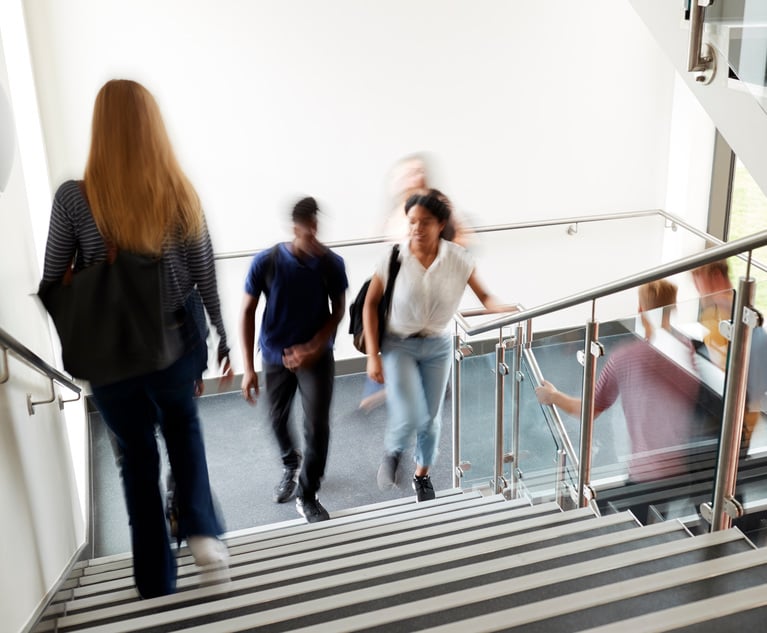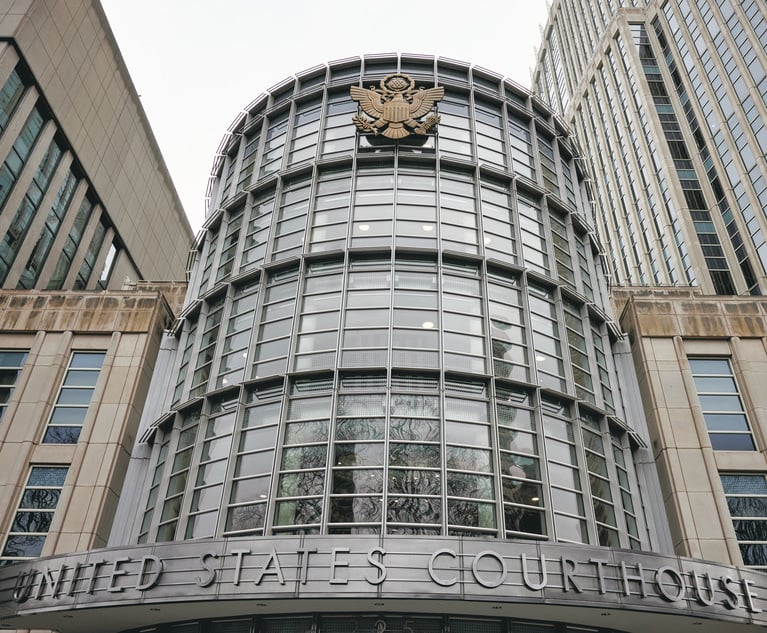Brooklyn Law Poaches New Dean From Rutgers
Incoming Brooklyn Law School Dean Michael Cahill aims to expand the school's non-J.D. offerings and launch a sustained fundraising campaign.
December 18, 2018 at 12:00 PM
3 minute read
 Michael T. Cahill, dean of Brooklyn Law School.
Michael T. Cahill, dean of Brooklyn Law School.
Brooklyn Law School has named Michael Cahill as its next dean.
Cahill is currently co-dean at Rutgers Law School—a position he has held since 2016. But the criminal law expert is no stranger to Brooklyn Law, where he taught and served as both associate dean for academic affairs and vice dean before leaving for Rutgers.
“I was at Brooklyn for 13 years, so this is a homecoming for me,” Cahill said in an interview Tuesday. “I know the people. I know the institution. I am thrilled to be coming home.”
Cahill is scheduled to assume the deanship July 1, replacing interim dean Maryellen Fullerton. Fullerton has led the school since former dean Nicholas Allard's abrupt departure in June after six years in the job. Allard said he stepped down to pursue other opportunities. Fullerton will return to teaching once Cahill is installed as dean.
Cahill is based at Rutgers' Camden campus but shares administrative responsibilities with co-dean David Lopez who is based in the Newark, New Jersey, outpost. He has spent much of the past two-and-a-half years fully merging the two campuses, which until 2015 had operated independently.
Brooklyn Law's independent status—unlike most schools it's not attached to a larger university—gives it greater flexibility to respond to the changing legal education marketplace, Cahill said. He credited the school with innovating both the curriculum and structure of its J.D. program, which can be completed in two, three or four years. One of his primary goals is to expand the school's non-J.D. offerings into programs such as master's degrees and certificates.
“[Brooklyn] needs to seize on that opportunity and start developing new programming and building out the kind of legal education it is offering outside of the J.D. program,” Cahill said.
Cahill's other goals center on bringing in the strongest J.D. students possible and launching a sustained fundraising campaign.
“We are very excited to welcome back Dean Cahill to lead our great law school forward,” said board of trustees chairman Stuart Subotnick in an announcement of the appointment. “His wealth of experience in legal academia; his deep knowledge of [Brooklyn] from his many years here as vice dean and associate dean and faculty member; and his vision to secure and advance the school's academic excellence while maintaining financial strength made him the clear choice among a field of exceptionally strong candidates.”
Cahill said it's still not clear whether legal education's fortunes are improving after a seven-year downturn. National figures from the American Bar Association show that first-year enrollment increased 3 percent this fall, and the number of applicants to law school surged 8 percent.
“Signs are promising that we are not going to continue going down,” Cahill said. “But that certainly doesn't mean we're going to go all the way up. We'll probably end up somewhere in the middle. That's why law schools need to recognize that they should be something other than just lawyer factories.”
This content has been archived. It is available through our partners, LexisNexis® and Bloomberg Law.
To view this content, please continue to their sites.
Not a Lexis Subscriber?
Subscribe Now
Not a Bloomberg Law Subscriber?
Subscribe Now
NOT FOR REPRINT
© 2025 ALM Global, LLC, All Rights Reserved. Request academic re-use from www.copyright.com. All other uses, submit a request to [email protected]. For more information visit Asset & Logo Licensing.
You Might Like
View All
The Met Hires GC of Elite University as Next Legal Chief

NY Appellate Panel Cites Student's Disciplinary History While Sending Negligence Claim Against School District to Trial

'No Evidence'?: Big Law Firms Defend Academic Publishers in EDNY Antitrust Case
3 minute read
'Substantive Deficiencies': Judge Grants Big Law Motion Dismissing Ivy League Price-Fixing Claims
3 minute readTrending Stories
- 1Bar Report - Jan. 27
- 2Cornell Claims AT&T, Verizon Violated the University's Wi-Fi Patents
- 3OCR Issues 'Dear Colleagues' Letter Regarding AI in Medicine
- 4Corporate Litigator Joins BakerHostetler From Fish & Richardson
- 5E-Discovery Provider Casepoint Merges With Government Software Company OPEXUS
Who Got The Work
J. Brugh Lower of Gibbons has entered an appearance for industrial equipment supplier Devco Corporation in a pending trademark infringement lawsuit. The suit, accusing the defendant of selling knock-off Graco products, was filed Dec. 18 in New Jersey District Court by Rivkin Radler on behalf of Graco Inc. and Graco Minnesota. The case, assigned to U.S. District Judge Zahid N. Quraishi, is 3:24-cv-11294, Graco Inc. et al v. Devco Corporation.
Who Got The Work
Rebecca Maller-Stein and Kent A. Yalowitz of Arnold & Porter Kaye Scholer have entered their appearances for Hanaco Venture Capital and its executives, Lior Prosor and David Frankel, in a pending securities lawsuit. The action, filed on Dec. 24 in New York Southern District Court by Zell, Aron & Co. on behalf of Goldeneye Advisors, accuses the defendants of negligently and fraudulently managing the plaintiff's $1 million investment. The case, assigned to U.S. District Judge Vernon S. Broderick, is 1:24-cv-09918, Goldeneye Advisors, LLC v. Hanaco Venture Capital, Ltd. et al.
Who Got The Work
Attorneys from A&O Shearman has stepped in as defense counsel for Toronto-Dominion Bank and other defendants in a pending securities class action. The suit, filed Dec. 11 in New York Southern District Court by Bleichmar Fonti & Auld, accuses the defendants of concealing the bank's 'pervasive' deficiencies in regards to its compliance with the Bank Secrecy Act and the quality of its anti-money laundering controls. The case, assigned to U.S. District Judge Arun Subramanian, is 1:24-cv-09445, Gonzalez v. The Toronto-Dominion Bank et al.
Who Got The Work
Crown Castle International, a Pennsylvania company providing shared communications infrastructure, has turned to Luke D. Wolf of Gordon Rees Scully Mansukhani to fend off a pending breach-of-contract lawsuit. The court action, filed Nov. 25 in Michigan Eastern District Court by Hooper Hathaway PC on behalf of The Town Residences LLC, accuses Crown Castle of failing to transfer approximately $30,000 in utility payments from T-Mobile in breach of a roof-top lease and assignment agreement. The case, assigned to U.S. District Judge Susan K. Declercq, is 2:24-cv-13131, The Town Residences LLC v. T-Mobile US, Inc. et al.
Who Got The Work
Wilfred P. Coronato and Daniel M. Schwartz of McCarter & English have stepped in as defense counsel to Electrolux Home Products Inc. in a pending product liability lawsuit. The court action, filed Nov. 26 in New York Eastern District Court by Poulos Lopiccolo PC and Nagel Rice LLP on behalf of David Stern, alleges that the defendant's refrigerators’ drawers and shelving repeatedly break and fall apart within months after purchase. The case, assigned to U.S. District Judge Joan M. Azrack, is 2:24-cv-08204, Stern v. Electrolux Home Products, Inc.
Featured Firms
Law Offices of Gary Martin Hays & Associates, P.C.
(470) 294-1674
Law Offices of Mark E. Salomone
(857) 444-6468
Smith & Hassler
(713) 739-1250






